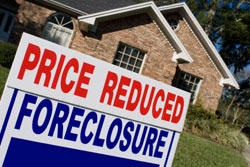How To Invest In Real Estate

During the real estate boom, many investors got caught up in the mania of buying real estate. In 2005, people I knew were going into the real estate industry left and right. Many seemed surprised that I elected not to buy any property.
Whenever someone asked me why I didn’t own real estate, I would simply point out that no properties near me cash flowed. I first started blogging about real estate in 2003, noting that a property in the same condo complex where I was renting was actually more money to own than to rent. I pointed out, correctly, that this meant I could not possibly cash flow on it as a rental with a 30-year fixed mortgage. (Those condos have already lost value, as I predicted, and are poised to drop further.)
Even though many looked at me like I was crazy for “throwing my money away”, I continued to rent. In August 2006, I predicted the real estate crash year by year, and also predicted that I would buy a house in late 2010. So far, my predictions have been eerily accurate; I predicted that Fannie and Freddie would crash, housing values would drop by at least 35%, and saw the recession coming.
I spent hundreds of hours accumulating data, confident that the coming crash would represent one of the biggest opportunities to buy property in our lifetimes. Here, I take my accumulated knowledge and answer your five most common questions about buying real estate.
Even better, I am also giving you a free copy of my rental property income worksheet. Frankly, it’s so worthwhile I could probably sell it, but I’m happy to give it away to you, my loyal reader. The worksheet allows you to plug in a few numbers and see quickly whether any property cash flows. You can download it after reading this post.
1: When is it a good time to invest in real estate?
The simple answer is “When you can get the lowest price to rent ratio for the property you are buying.” Here’s how to find the ratio:
Find a comparable rental (craigslist is good for single-family home rentals.) Find the purchase price of your property. Take the purchase price and divide it by the lowest price of the comparable rental in the same neighborhood. For instance, if the property price is $199,000, and the rental price for a similar property is $1595.00, your ratio would be 124.76.
Ideally, look for a ratio of 100 or less. 80 is awesome. Anything better than 80 and you’re probably looking at significant repairs; factor any repair costs into your purchase price. Anything over 150 isn’t worth buying; it won’t cashflow well as a rental. Anything over 200 isn’t worth buying even if you plan to live in it, since the house will most likely lose value over the next 3-5 years to the extent that renting is a more worthwhile option.
This is my first step in plotting out a potential investment, since it fairly quickly weeds out overpriced properties.
2: What type of real estate should you buy?
I wasn’t sure, so I asked an expert: Jim the Realtor. Jim is in the business of selling real estate, but he’s also honest and blunt — characteristics I appreciate! He said two things that I hadn’t heard previously:
- Jim recommends buying a single-family home with at least 1500 square feet, with at least 3 and preferably 4, bedrooms. Here’s the key: The bedrooms should all be on the ground floor. Jim says that a lot of older couples will be selling their homes and looking to rent; by owning a rental property with all the bedrooms on the ground floor, you can attract them. Older people also make great, consistent tenants.
- For most “owner-occupied” mortgages (which are much easier to qualify for at this juncture), you need only live in the property 1 year from when you purchase it. Then, as long as you keep the same mortgage, you can rent out the property.
If you plan to do this, there are a couple of caveats. First of all, not all mortgage documents have a 1-year timeframe, so check your mortgage documents before you sign them! Secondly, assuming you plan to buy another property and start a “property ladder”, remember that your next mortgage company will only let you count 75% of your rental income as income for your next mortgage. Also, since you already have one mortgage, your credit score will probably be lower, which might impact your rates on your next house.
Study the implications of this before you decide to rent out your first property and “ladder” — preferably with your accountant — but even with the restrictions, this may make sense for you.
HOA fees
I don’t recommend buying an investment property with HOA (Home Ownership Association) fees if you plan to own it long-term. A $100/month HOA fee may not seem like much, until you do the math for 30 years: it’s $36,000! That’s a huge chunk of profit flushed right down the drain. If you insist on buying a property with HOA fees, make sure it’s discounted by at least $20,000-$30,000 compared to a property with no fees. Also, when performing your price-to-rent calculation, subtract the HOA fees from your potential rent price.
3: Where should you buy a property?
Most people tend to assume their immediate area is best for buying real estate, when it may not necessarily be. What should you look for in a place to buy real estate? Here’s a short list:
Job growth: Look for an area that has had better-than-average job growth over the past 10 years. Use caution when buying in an area overly dependent on one sector of the economy, such as Silicon Valley and the tech industry. If the general metro area hasn’t had job growth, but the neighborhood you are looking to invest in is desirable, that might also be a decent choice. Unemployment rate ideally should be lower than average.
Median income: Higher isn’t necessarily better; look for a neighborhood with a steady median income.
Good schools: Many families renting will pay more for better schools. Find a school’s API rating. Make sure it’s better than surrounding zip codes. GreatSchools.net has this information.
Proximity to public transit: This will become critical as gas prices go back up (and since you’re buying for the long term, expect them to!) Ideally, your house would be located close to at least two types of public transit…but not so close that the house shakes every time the train comes in.
Walkability: Another factor that will become more critical in the future. WalkScore.com gives you this information, on a scale of 0 to 100. Ideally, your property would have a 60+ score.
Property tax rates: Consider state property tax rates, and state government health, when making your decision. For instance, California can only increase your property taxes 2% per year thanks to Prop 13, but the state is bankrupt and is currently seeing a mass exodus of citizens to other states. Due to government issues, California probably isn’t the most ideal state to buy property in.
4: Should you buy right now?
There are definitely some properties that are cashflowing right now, but many are in out-of-the-way areas that require a car, where rent prices haven’t plunged as much as they likely will in the future. While there are certainly investors in the market right now buying great properties, there’s also a frenzy for lower-priced properties. First-time buyers, lured by the $8000 Obama tax credit and 3% down FHA loans, are competing with investors. Higher-priced properties, on the other hand, have farther to drop.
While I don’t deny that there are a few folks out there getting amazing deals right now, I think small-time investors should wait until the first-time buyer frenzy has subsided and better, closer-in properties start to really drop. I don’t think you have long to wait; 12 to 18 months should be sufficient to buy your first property, and the good deals will continue for 3-5 years past that. Don’t rush; there are plenty of deals to go around.
Spring has far more buyers than winter; savvy buyers will wait until the end of the calendar year to buy, no matter what year it is.
5: What’s most critical?
The most critical component of investing in residential real estate is cash flow. Will rents continue to stay the same, or will they plummet since everyone is leaving the city you want to invest in?
In my spreadsheet, I don’t account for potential gains in property value as a component of a real estate investment. That’s because I know that in a sane market, real estate only appreciates about as fast as inflation…and over the next few years, it’s likely that any property you buy will actually depreciate a bit.
If there is one lesson I can impart to you, it’s don’t buy real estate based on potential appreciation. Ever! Even if the only calculation you do is the price-to-rent ratio, you’re still better off than those who buy hoping for appreciation.
Always buy a property that cash flows well as a rental, even if you never plan to rent it out! Why? Having the flexibility to rent the property gives you the ability to move and start your own property ladder instead of paying 5-6% to sell. Buying a property with a low price-to-rent ratio also protects you, to some degree, from price depreciation.
Are you in the market? Waiting? Have you purchased income property recently? I’d love to hear your stories in the comments!
Download my rental property cash flow worksheet for residential real estate investing.
Read my previous posts about real estate.
This post was featured in the Carnival of Personal Finance.


